The Enduring Impact of Mythology on Culture and Identity


Intro
Mythology is not merely a series of tales spun from the imagination of ancient peoples; it weaves through the very fabric of human experience, acting as a mirror that reflects our collective struggles, values, and aspirations. At the core of these narratives lies a power that has transcended time and geography, shaping cultures and ethical frameworks across generations. From the epic of Gilgamesh to the intricate tales of the Greek pantheon, myths offer profound insights into the human condition.
As we embark on this exploration, we'll uncover how these stories, often rich in symbolism and steeped in moral lessons, continue to resonate with us today. They inform our identities, guide our moral compass, and provide a means of understanding the complexities of life. The relevance of mythology extends beyond dusty books and ancient scrolls; it remains a vital component of modern-day discourse.
Let’s unravel the threads that connect timeless myths to contemporary thought, illuminating the transformative power of these narratives and their role in shaping who we are.
Preamble to Mythology
Mythology is a rich tapestry of stories, symbols, and narratives that has woven itself into the very fabric of human culture. It beckons both scholars and the curious alike to explore its depths. Understanding mythology is more than a mere academic exercise; it offers profound insights into human behavior, societal norms, and cultural values. The importance of exploring mythology lies in its capacity to reveal why we are the way we are.
By diving into ancient tales, we unearth the shared fears, hopes, and dreams that resonate even today. Myths serve as mirrors reflecting the values of their time, and they continue to influence modern storytelling, from literature to films. They guide us through moral dilemmas, offering archetypal heroes and villains that embody the essence of our ethical struggles. Exploring these stories illuminates the foundations upon which many societies have been built.
Defining Mythology
At its core, mythology encapsulates the narratives that cultures create to explain the world around them. These tales often blend the divine with the mundane, featuring gods, heroes, and mythical creatures. They tackle questions still pondered today: How did the world begin? What is the nature of good and evil?
"Myths are the stories that quietly shape our existence, often without us realizing their influence."
For instance, consider the tale of Prometheus in Greek mythology, who stole fire from the gods to give to humanity. This myth speaks not only of the consequences of defiance but also illustrates the human pursuit of knowledge and innovation. It’s this interplay between the sacred and the human experience that defines mythology, making it a crucial part of any culture's identity.
Historical Context of Myths
Every myth holds historical significance, rooted in the beliefs and practices of the times they were created. The context in which myths are born is critical. For example, ancient Sumerian myths emerged in the cradle of civilization, reflecting the agricultural advancements and social structures of early society. On the other hand, Norse myths developed in the harsh climates of Scandinavia, echoing the values of strength and resilience in the face of adversity.
One might look at the way these stories have evolved. Cultures often adapt their myths to align with changing societal values or upheavals. The shift from polytheism to monotheism in many cultures redefined existing narratives, often merging deities into a singular, ultimate force.
- Preservation of Cultures: Mythology serves as a repository of knowledge, preserving the wisdom of ancestors and cultural practices.
- Influence on Art and Literature: Many works of art and literature have their roots in mythological stories, showcasing their impact across generations.
- Framework for Understanding the World: Myths provide templates for understanding life’s mysteries, making chaos into something graspable and relatable.
In summary, mythology is not merely a collection of stories but a pivotal aspect of human culture that provides a framework for understanding our past and present.
Mythology Across Cultures
Mythology serves as a profound reflection of human civilization and its intricate tapestry. It encompasses narratives that not only entertain but also elucidate the shared beliefs, values, and struggles of different societies. Understanding mythology across diverse cultures grants us insights into how different communities interpret existence, morality, and their own identities. Each culture’s myths are like a mirror, revealing how they perceive the universe and their place within it.
Mythology is significant in the way it helps us connect these disparate narratives, showing common threads and distinct characteristics in beliefs and values. These stories often address universal themes, such as life, death, love, and morality, making them relevant even today. One can appreciate how myths can teach valuable life lessons and offer moral guidance—a compendium of dos and don’ts woven into the fabric of storytelling.
Whether through the grand epics of ancient Greece or the vibrant oral traditions of Indigenous peoples, myths shape cultural heritage and continue to inform contemporary societal dynamics.
The Greek Pantheon
The Greek Pantheon is a cornerstone of classical mythology. The gods and goddesses—like Zeus, Hera, and Poseidon—embody various human traits and natural elements. Each deity has narratives that touch on love, vengeance, power, and the intricate dance of fate. Their stories represent not only the ancients' worship practices but also provide a rich exploration of human experience, revealing our follies, aspirations, and fears.
In a culture where public life was intertwined with the divine, these myths served both as entertainment and as a means of explaining the world. Epics such as the Iliad and Odyssey not only showcase heroism but delve into the human condition itself, where gods interact with humans, often reflecting societal values and moral lessons.
Norse Mythology
Norse mythology offers a different lens through which to view human existence and destiny. The tales of gods like Odin, Thor, and Loki highlight themes of honor, sacrifice, and the struggle against chaos. These narratives emerged in a harsh landscape, reflecting the values and philosophies of the Scandinavian tribes, emphasizing bravery and resilience. The striking contrast of light and darkness, creation and destruction, reflects a worldview steeped in duality.
The myth of Ragnarok, a prophetic end of the world scenario, serves as a powerful reminder of the cyclical nature of existence. This fall of gods and the subsequent rebirth of the world underscore the belief that death leads to new beginnings, a sentiment that resonates even in today’s understanding of cycles in nature and life.
Egyptian Myths
The mythology of ancient Egypt is rich with symbolism and profound philosophy. Deities like Ra, Osiris, and Isis not only governed the ancient Egyptians' understanding of the afterlife, but also underscored their agricultural practices and daily rituals. The myth of Osiris, for example, encapsulates themes of resurrection and eternal life, which were central to Egyptian culture. These stories informed their beliefs about morality, governance, and the cosmos.
Rituals and temple practices stemmed directly from these narratives, illustrating the interwoven nature of faith and governance. The repeated emphasis on the afterlife reflects a deeply ingrained belief in the importance of moral living, as one’s conduct in this life would dictate their fate in the next.
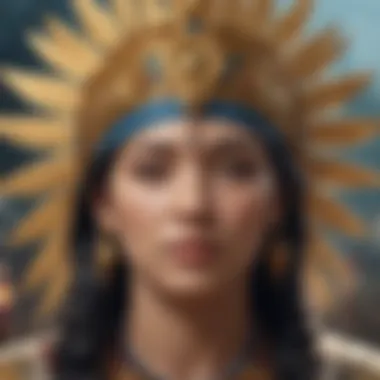
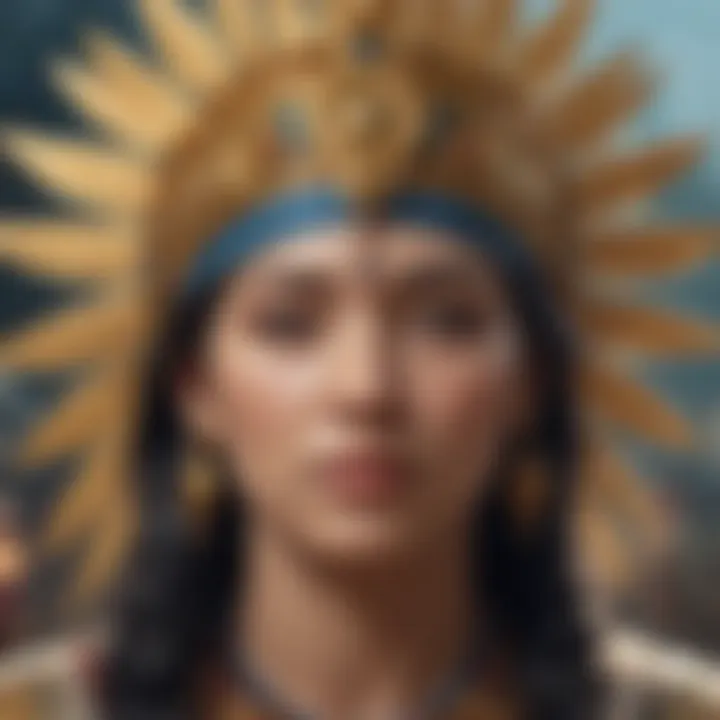
Indigenous Mythologies
Indigenous mythologies are a vast and varied tapestry of narratives that illuminate the connection between people and nature. These stories—passed down through oral traditions—serve to teach cultural values, community rules, and a profound respect for the earth. They embody an intrinsic understanding of the world, emphasizing harmony and coexistence with nature.
For instance, many Indigenous tribes possess creation myths that explain the origins of Earth, the stars, and humanity itself. These narratives not only provide context for their existence but often include teachings about sustainability, demonstrating an early recognition of ecological balance. Moreover, many of these stories intersect with ancestral wisdom, which is crucial for cultural identity and continuity.
Together, the study of mythology across these cultures unveils shared traits and disparate interpretations, emphasizing the importance of context in shaping human understanding of the universe. Each mythology contributes to a rich mosaic, ensuring that the diverse experiences of humanity are both remembered and revered.
Themes in Mythological Narratives
The exploration of themes in mythological narratives opens a window into the human condition. Myths are not just fanciful stories; they resonate with our deepest fears, desires, and quests for understanding. By engaging with these themes, we gain insights into cultural values and the moral frameworks that guide societies over time. The weight of these narratives often lies in their ability to spark critical questions about existence, behavior, and identity, making them relevant even in contemporary discussions.
Creation and Origin Stories
The theme of creation and origin stories runs deep in the fabric of mythology across cultures. These narratives detail how the world came to be, often featuring deities or forces who shape the cosmos. Take for instance, the Genesis creation narrative from the Bible, which describes how God created the world in six days. Unlike the scientific perspective of evolution, this story provides a metaphysical understanding of creation, layering profound implications about existence and purpose.
Another fascinating example is the Hindu cosmology, where the universe is perceived as a cyclical process rather than a linear one. In Hindu mythology, the universe undergoes cycles of creation and destruction, emphasizing the transitory nature of life. Thus, creation myths often reflect not only the origin of the universe but also the values a culture holds dear.
These stories influence our understanding of human life, touching upon concepts like destiny, divinity, and moral obligations. When we engage with these narratives, we explore not just how we came to be, but also what it means to exist.
"The beauty of myth is that it allows us to grasp the intangible—the mysteries of life that may elude rational understanding."
Hero's Journey
The Hero's Journey is a motif understood universally but highlighted particularly in Western literature. This narrative structure involves a hero who embarks on an adventure, faces challenges, experiences transformation, and returns home changed. Joseph Campbell brilliantly outlined this journey, mentioning stages such as the call to adventure, crossing the threshold, and returning with the elixir.
Think of Odysseus in Homer's The Odyssey, who embarks on a perilous journey back home. His adventures, filled with trials and tribulations, ultimately shape him both as a hero and as a person. This theme illustrates the idea that growth often comes through overcoming adversity, revealing the strength within.
Whether in ancient epics or modern cinema, the Hero's Journey resonates profoundly with audiences because it mirrors individual experiences. We all encounter obstacles and seek redemption or knowledge, making this theme particularly timeless.
Good vs Evil
The battle between good and evil is perhaps one of the most pervasive themes in mythology. It's an exploration of morality, justice, and the struggle for balance. Various cultures depict this dichotomy through gods and monsters, heroes and villains. The Zoroastrian concept of dualism is a prime example, where the eternal conflict between the god of light Ahura Mazda and the evil spirit Angra Mainyu portrays this perpetual tension between good and evil forces.
In Greek mythology, the tale of Prometheus, who defied the gods to give fire to humanity, reflects the complexities of good and evil. While his act is considered noble, it also brings dire consequences, showcasing that intentions can be morally ambiguous. Through these narratives, audiences grapple with fundamental questions regarding morality and the nature of evil, prompting reflections on their personal beliefs and societal norms.
In summary, themes in mythological narratives offer a robust framework for understanding identity, moral questions, and the human experience. Through creation stories, the Hero's Journey, and battles between good and evil, these tales remain significant touchstones in our quest for meaning.
Psychological Dimensions of Mythology
The psychological aspects of mythology play a significant role in understanding how human beings relate to narratives and their effects on the psyche. Myths offer not only fascinating stories but also insights into our inner worlds. They mirror the collective experiences of humanity, contributing to our understanding of consciousness, identity, and behavior. By exploring the psychological dimensions, we can appreciate how myths influence thought patterns and emotional responses. This section will focus on three critical elements: the collective unconscious, archetypes, and personal identity—all of which are intertwined within the realm of mythology.
Myths and Collective Unconscious
The concept of the collective unconscious, introduced by psychologist Carl Jung, is pivotal when discussing myths. Jung proposed that it is a part of the unconscious mind shared among beings of the same species. This universal memory consists of archetypes and primordial images that manifest in myths across cultures.
For instance, the flood myth narrating a cataclysmic event is found in various cultures—from the Biblical Noah to the Mesopotamian Epic of Gilgamesh. Such shared experiences signify that certain underlying psychological themes resonate through humanity, transcending time and geography.
"Myths are like windows into the psyche, revealing truths about our shared human experience."
The Role of Archetypes
Archetypes serve as fundamental building blocks of storytelling. They represent universal patterns of human behavior and emotions, making them relatable across various cultures and eras. Some common archetypes include:
- The Hero: Embodies courage and the pursuit of a noble quest.
- The Mentor: Provides wisdom and guidance, protecting the hero on their journey.
- The Shadow: Represents the darker sides of human nature, confronting the hero with their fears.
By identifying these archetypal figures in myths, individuals can navigate their own lives more effectively. Recognizing the archetypes can also lead to personal growth. For example, one might see themselves as a hero in their life story, encouraging resilience in the face of challenges.

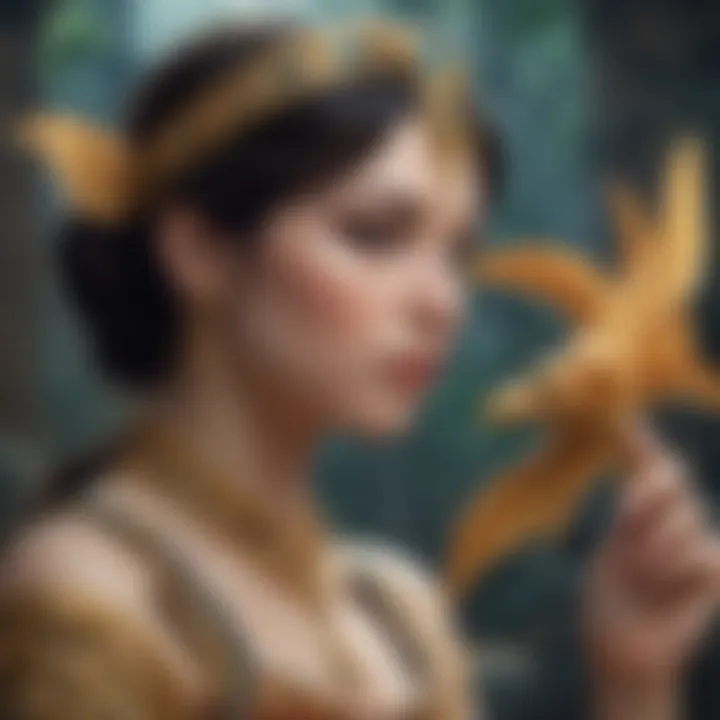
Mythological Influence on Personal Identity
Mythology has a profound influence on shaping personal identity. Individuals often internalize mythic narratives, aligning their life experiences with the lessons and morals depicted in the stories.
Many people find that their personal saga reflects themes found within their cultural myths, such as overcoming obstacles or the search for belonging. Such alignment allows individuals to draw strength from these narratives, framing struggles as part of a larger narrative arc.
In today’s digital age, this connection has grown more complex.
- Social Media: Platforms like Facebook and Reddit often see users sharing and interweaving personal stories with mythological references.
- Literature and Art: Contemporary artists frequently evoke mythological themes, allowing for deeper connection and interpretation in modern settings.
Individual narratives enriched by myth serve as a touchstone for understanding oneself and the broader society. Ultimately, myths provide a map of the human experience, linking personal introspection with collective tradition.
Societal Impacts of Myths
The influence of mythology extends far beyond mere storytelling; it weaves itself into the very fabric of societies, fashioning their beliefs, norms, and values. Myths serve as lenses through which cultures interpret the world around them and navigate the complexities of human existence. Understanding their impacts is crucial not just for historians or anthropologists, but for anyone grappling with the identity and ethical constructs in today’s diverse societies. They often reflect societal values and collective aspirations, helping to mold social norms across generations.
Myths in Politics
Myths occupy a formidable place in the realm of politics. Politicians often harness mythological narratives to legitimize their authorities or policies. Think back to ancient Rome, where the story of Romulus and Remus—the founding myth—shaped national identity. Such tales can instill a sense of unity or nationalism, often becoming rallying cries during times of crisis. Take, for example, the call to arms during the world wars, deeply rooted in national myths.
In modern contexts, politicians use myths wrapped in patriotic themes to galvanize public support, appealing to a collective identity. These stories simplify complex issues, creating a black-and-white divide. However, they can also erase nuances, leading societies into contentious ideologies.
"The use of mythology in politics reveals how narratives can manipulate perceptions, ultimately altering the very course of history."
Mythology and Religion
The symbiosis between mythology and religion is undeniable. Many religions spring from mythological roots, with their foundational stories shaping beliefs, practices, and rituals. For instance, in Hinduism, the epic tales of the Ramayana and Mahabharata convey moral lessons and social principles that govern behavior and expectations.
Moreover, myths provide the scaffolding for religious identities, establishing a framework within which followers find meaning. They articulate the human relationship with the divine, embodying not just truths about gods, but reflections on human nature itself. Through myth, followers can navigate the unexplained—offering hope during crises, explaining death, and providing moral guidance.
Mythology and Ethics
Ethics and morality are often steeped in mythological tradition. Myths encapsulate ethical lessons that endure over centuries, serving as foundational guides for societal behavior. A classic example is the tale of Icarus. His flight too close to the sun offers a cautionary message about hubris and the perils of exceeding one’s limits.
These narratives are not merely entertaining; they create a benchmark for acceptable behavior. Myths resonate with listeners, encouraging reflections on virtue, vice, and the intricacies of human interaction. They are timeless parables teaching us about courage, sacrifice, and justice.
As societies morph and evolve, the ethical frameworks derived from mythology remain essential, often influencing contemporary discussions around morality. In an age rife with moral ambiguity, these ancient tales can still serve as guideposts, reminding us of enduring principles that transcend generations.
Contemporary Interpretations of Myths
Contemporary interpretations of myths hold significant importance in understanding their evolving role and impact in today’s society. As narratives passed down through generations, myths resonate with the human experience, providing insight into our values, beliefs, and conflicts. Modern reinterpretations serve to connect ancient stories to current realities, making them relevant for new audiences. Through literature, film, and popular culture, myths are not abandoned relics but dynamically reshape our perceptions of identity and morality. Recognizing this enables us to appreciate how these narratives adapt, ensuring they stay alive in the collective psyche.
Mythology in Modern Literature
In modern literature, mythology plays a critical role in shaping narratives and character development. Authors often draw upon ancient tales to inform their stories, reflecting contemporary concerns and ideals. For instance, Neil Gaiman’s American Gods weaves together various mythological figures from diverse traditions, exploring themes of belief and culture clash in a rapidly changing America. The fusion of mythology with realism adds depth to characters, grounding their experiences in familiar archetypes. This technique allows readers to recognize their own struggles reflected in the mythological, bridging the gap between timeless truths and individual narratives.
- Thematic Resonance: By employing mythological themes, authors often address complex issues like identity, morality, and societal change.
- Character Archetypes: Mythic characters serve as archetypes that audiences can relate to, making storylines more profound and engaging.
- Cultural Commentary: Literature that reinterprets myths often critiques current societal norms, prompting readers to reflect on their contexts.
In this way, modern literature not only preserves myths but also transforms them, ensuring their relevance to contemporary discussions.
Mythological Elements in Film
Films have a unique capacity to reinterpret and visualize mythological stories in striking ways. Cinematic mediums can introduce these narratives to wider audiences, breathing new life into age-old tales. Movies like The Lion King embed elements of African folklore and mythology, illustrating the hero's journey through visually compelling storytelling. Similarly, Thor from Marvel Comics taps into Norse mythology, reimagining its characters within a modern superhero context, thereby appealing to both mythology enthusiasts and general audiences.
Popular films often weave mythological motifs into their plots, allowing viewers to reflect on universal themes. Consider the following:
- Visual Storytelling: Mythological elements lend themselves to spectacular visuals, enhancing the emotional impact.
- Cultural Blending: Writers mix different myths, offering fresh interpretations that explore pluralism in today's societies.
- Reinvention of Archetypes: Films often reinvent timeless archetypal characters, giving them new meanings within contemporary settings.
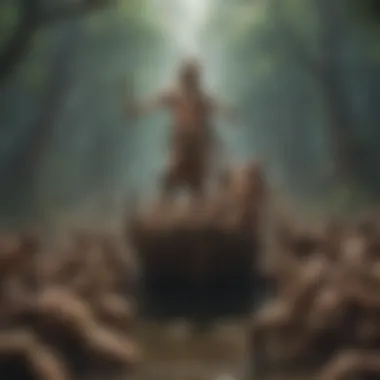
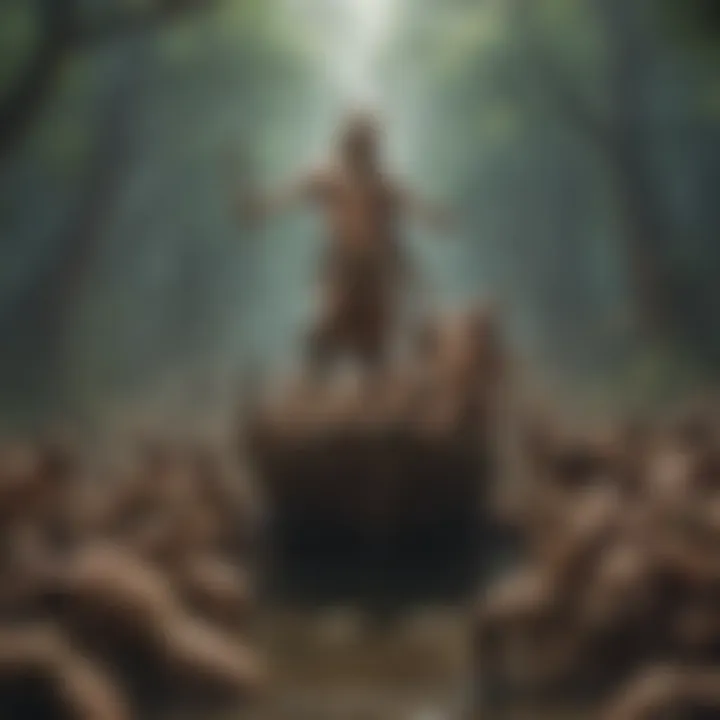
Thus, film serves as a significant venue for revisiting myths, allowing these narratives to resonate with the digital generation.
Popular Culture and Myths
In popular culture, myths manifest in varied forms, whether through music, fashion, or social media. Trends often draw from mythological symbols and stories, shaping how people express their identities today. Tattoos of mythological figures, for example, reflect personal beliefs tied to ancient narratives, while contemporary music may sample verses from mythic texts, infusing them with a modern twist.
Furthermore, the adaptation of mythological themes can be seen in social media trends, where discussions around mythology often populate platforms like Reddit and Facebook. Engagement in these spaces allows for a community-driven exploration of ancient stories with relevance to current societal questions.
The impact of popular culture on myths includes:
- Cultural Identity: People use mythic references to communicate their backgrounds and identity in a globalized world.
- Cultural Critique: Artists often critique societal issues through mythological references, prompting dialogue among audiences.
- Accessibility: It brings myths into everyday life, making them relatable and engaging for those who might not otherwise explore traditional narratives.
As myths continue to permeate various aspects of popular culture, they not only contribute to personal expression but also foster deeper understanding and appreciation of their origins and significance.
The Relevance of Myths Today
In the current landscape, myths hold an undeniable significance that transcends time and culture. They are not mere stories; they are complex narratives woven through the fabric of human existence. The relevance of myths today can be explored through various lenses, including their role as moral compasses, connections to personal narratives, and their evolving nature in modern society.
Myths as Moral Compasses
Myths serve as ethical guidelines, providing insight into the values and beliefs of different cultures. They act like a moral map, offering direction and meaning amid life's complexities. As modern society faces moral dilemmas, these ancient tales remind us of the principles that once guided our ancestors.
"Myths illustrate choices and consequences, often framed in the context of heroic journeys that unveil moral truths.”
For instance, stories like the trials of Odysseus reveal the importance of perseverance and loyalty. These lessons remain relevant today, giving individuals a framework to navigate issues like fidelity and justice. Additionally, myths from indigenous cultures frequently emphasize respect for nature, highlighting ecological ethics that are urgently needed in today’s context, where environmental crises loom large.
Exploring Personal Narratives through Myths
Personal narratives are shaped profoundly by the myths we inherit. Every individual harbors a unique blend of beliefs and stories influenced by cultural narratives. People often draw parallels between their life experiences and mythic structures, creating a sense of belonging and identity.
For example, someone might find a sense of kinship with Persephone from Greek mythology, reflecting their own experiences of growth through hardship and rebirth. Such connections empower individuals to construct their own life stories, extracting meaning from both personal and cultural sources. By interpreting our struggles through mythological frameworks, we can better understand our place in the world and the narratives we wish to create for ourselves.
The Evolution of Myth in Modern Society
In an evolving world, myths adapt and transform, much like the societies that create them. The rise of digital media has played a crucial role in reshaping myths, as traditional stories find new life in films, video games, and books. These adaptations allow mythological themes to resonate with contemporary audiences, reflecting modern issues and values.
For example, superhero films often draw on mythological archetypes such as the hero and the mentor. Characters like Wonder Woman and Thor are modern iterations of ancient heroes, grappling with themes of duty, justice, and identity in a globalized society.
Moreover, online platforms allow for the dissemination and reinterpretation of myths on a massive scale, encouraging fresh perspectives. In forums like Reddit or through social media discussions on mythology, individuals can share interpretations and personal connections to these ancient stories, continuously breathing life into myths.
End
When we consider the wealth of knowledge embedded within mythology, it becomes clear how essential these narratives are to understanding ourselves and the societies we inhabit. Mythology is not merely a collection of ancient stories; it represents a tapestry woven from the threads of morality, culture, and identity. The role myths play today cannot be underestimated. They guide us through ethical dilemmas, help shape our personal narratives, and connect us with our collective past.
Summation of Mythological Significance
Throughout this exploration, we've seen how pivotal mythology is to human experience. Myths provide frameworks for interpreting life events and understanding human emotions. They capture the essence of the struggles and aspirations that define our existence. Through mythology, individuals can grapple with complex concepts such as good versus evil, love, sacrifice, and transcendence. These tales serve as mirrors reflecting our deepest fears and aspirations, thereby offering insight into our collective psyche.
Moreover, myths give life to abstract ideas and moral dilemmas, making them more relatable and digestible. By encapsulating profound existential questions in narrative form, mythology engages individuals of all ages and backgrounds, creating a shared cultural vocabulary. For students and educators, these stories act as invaluable teaching tools, reinforcing lessons about resilience, courage, and the human spirit.
Future of Mythology in the Digital Age
As we navigate modernity, the relevance of mythology continues to evolve. In the digital age, these ancient stories find new life through technology. Digital platforms have amplified how we engage with myths, enabling them to reach wider audiences than ever before. From interactive games to virtual exhibitions, mythology's diverse forms are being revitalized and reshaped to fit contemporary contexts.
Social media, in particular, has created a unique space for mythological narratives to flourish. Platforms like Reddit and Facebook have become forums for sharing interpretations, discussions, and innovative retellings of age-old fables. This democratization of myth allows for a richness of perspectives and encourages a broader exploration of themes that resonate across cultures and generations.
Furthermore, as society becomes more interconnected globally, myths serve as bridges that help us understand diverse cultural narratives. The integration of myth into pop culture—through movies, literature, and even marketing—reveals how these stories continue to captivate the human imagination, fostering an appreciation of our shared human experience.
In light of these observations, it’s evident that mythology remains more than relevant; it is a vital component of modern identity and ethics. The continued exploration and reinterpretation of these stories will undoubtedly influence future societies, encouraging dialogue and introspection.
"Myths are not just stories of old; they are the blueprints of the human experience, shaping our ethical frameworks and personal journeys."
In summation, as we delve into the layers of mythology within contemporary society, we uncover a wellspring of inspiration and understanding. The task now lies in embracing these narratives—allowing them to inform our paths toward growth, connection, and realization in an increasingly complex world.



